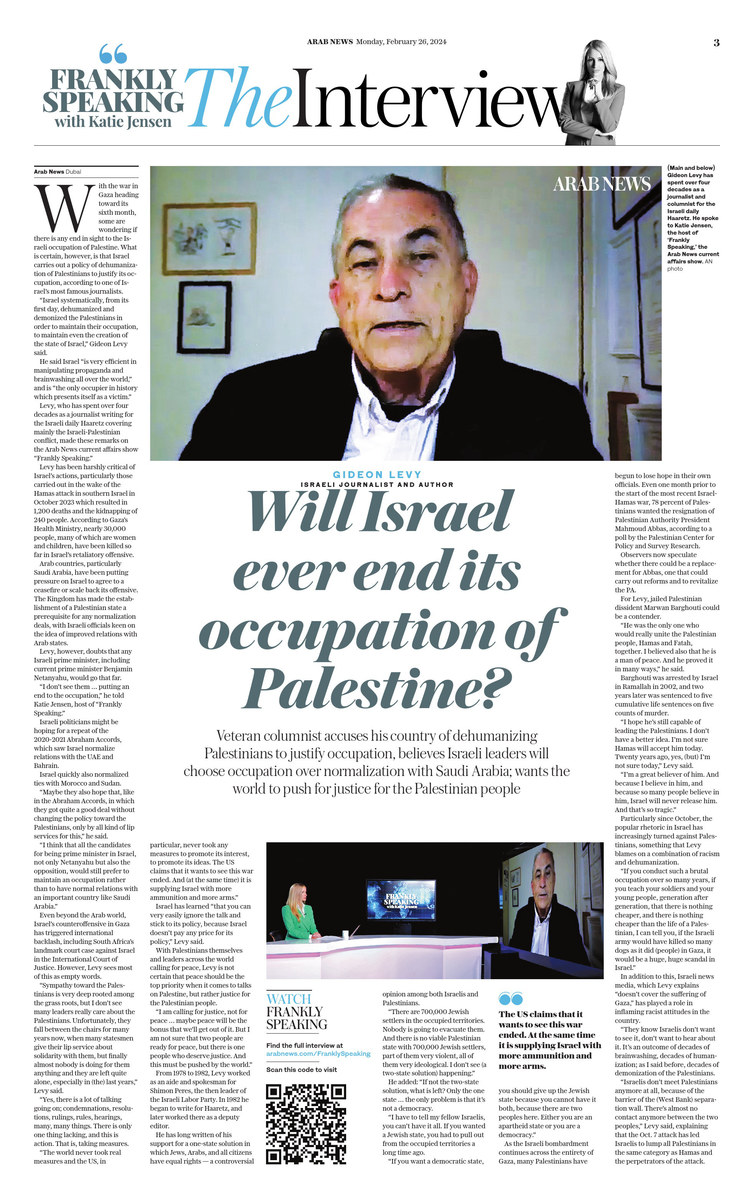DUBAI: With the war in Gaza heading toward its sixth month, some are wondering if there is any end in sight to the Israeli occupation of Palestine. What is certain, however, is that Israel carries out a policy of dehumanization of Palestinians to justify its occupation, according to one of Israel’s most famous journalists.
“Israel systematically, from its first day, dehumanized and demonized the Palestinians in order to maintain their occupation, to maintain even the creation of the state of Israel,” Gideon Levy said.
He said Israel “is very efficient in manipulating propaganda and brainwashing all over the world,” and is “the only occupier in history which presents itself as a victim.”
Levy, who has spent over four decades as a journalist writing for the Israeli daily Haaretz covering mainly the Israeli-Palestinian conflict, made these remarks on the Arab News current affairs show “Frankly Speaking.”
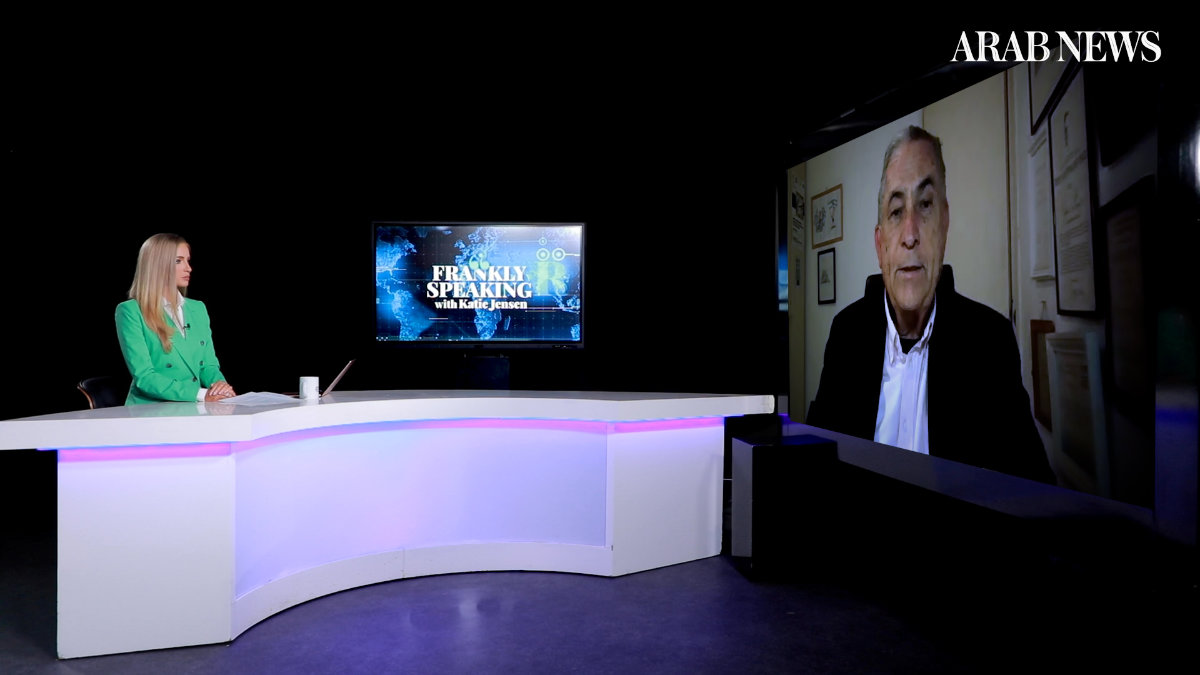
Gideon Levy has spent over four decades as a journalist and columnist for the Israeli daily Haaretz. He spoke to Katie Jensen, the host of “Frankly Speaking,” the Arab News current affairs show. (AN photo)
Levy has been harshly critical of Israel’s actions, particularly those carried out in the wake of the Hamas attack in southern Israel in October 2023 which resulted in 1,200 deaths and the kidnapping of 240 people. According to Gaza’s Health Ministry, nearly 30,000 people, many of which are women and children, have been killed so far in Israel’s retaliatory offensive.
Arab countries, particularly Saudi Arabia, have been putting pressure on Israel to agree to a ceasefire or scale back its offensive. The Kingdom has made the establishment of a Palestinian state a prerequisite for any normalization deals, with Israeli officials keen on the idea of improved relations with Arab states.
Levy, however, doubts that any Israeli prime minister, including current prime minister Benjamin Netanyahu, would go that far.
“I don’t see them … putting an end to the occupation,” he told Katie Jensen, host of “Frankly Speaking.”
Israeli politicians might be hoping for a repeat of the 2020-2021 Abraham Accords, which saw Israel normalize relations with the UAE and Bahrain.
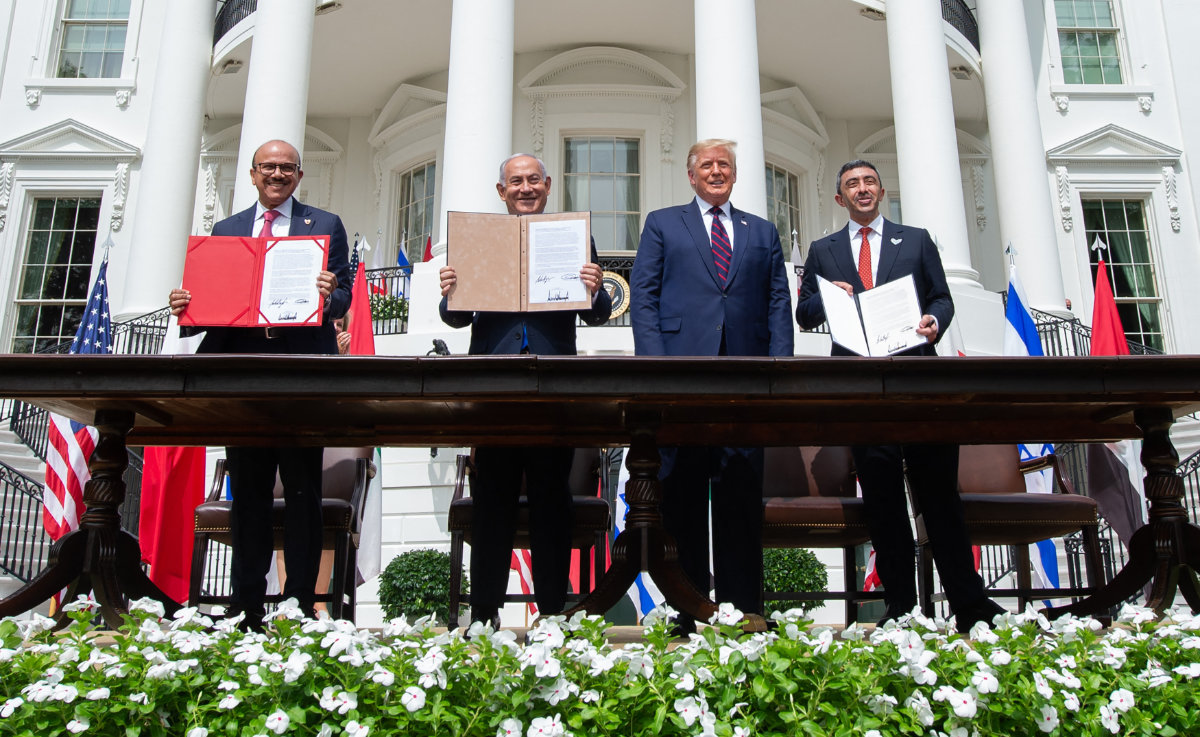
Israeli PM Benjamin Netanyahu (2-R) grins from ear to ear after signing the so-called Abraham Accords with Bahrain Foreign Minister Abdullatif Al-Zayani (L) and UAE Foreign Minister Abdullah bin Zayed Al-Nahyan (R), brokered by the US government under President Donald Trump (2-R), at the White House in Washington, DC, on Sept. 15, 2020. (AFP/File)
Israel quickly also normalized ties with Morocco and Sudan.
“Maybe they also hope that, like in the Abraham Accords, in which they got quite a good deal without changing the policy toward the Palestinians, only by all kind of lip services for this,” he said.
“I think that all the candidates for being prime minister in Israel, not only Netanyahu but also the opposition, would still prefer to maintain an occupation rather than to have normal relations with an important country like Saudi Arabia.”
Even beyond the Arab world, Israel’s counteroffensive in Gaza has triggered international backlash, including South Africa’s landmark court case against Israel in the International Court of Justice. However, Levy sees most of this as empty words.
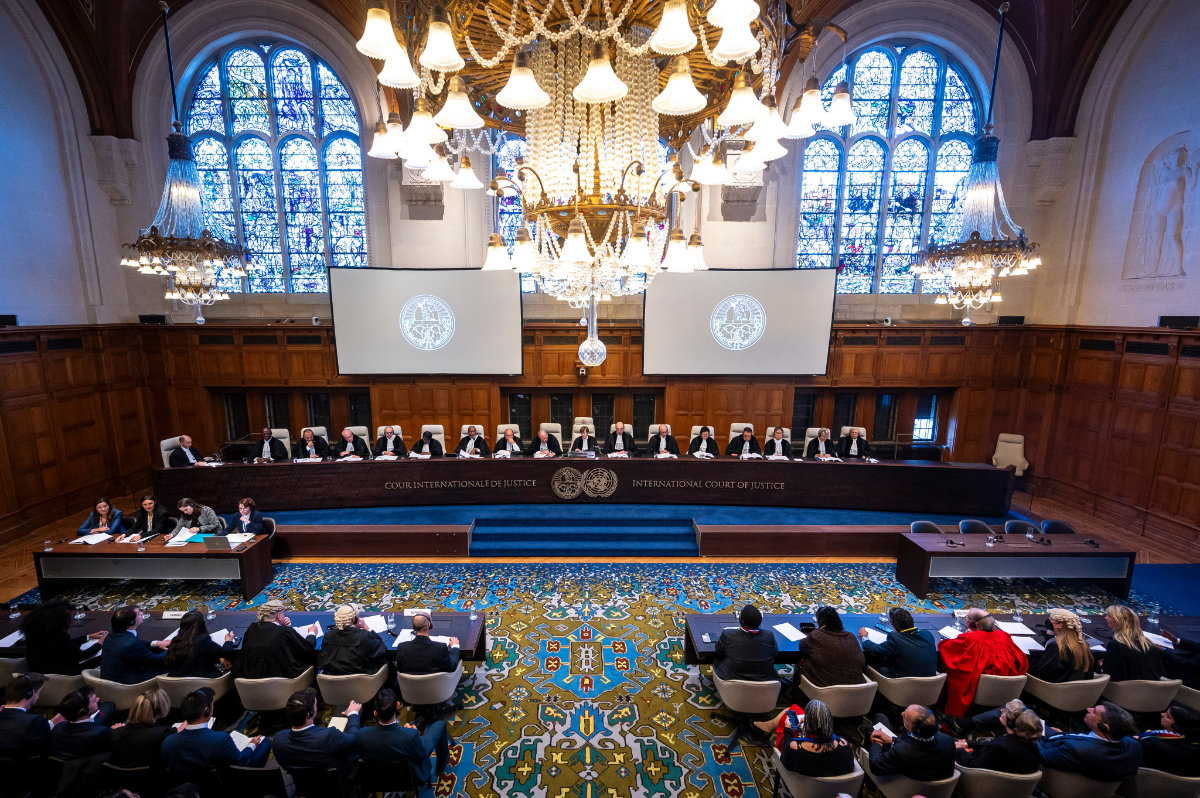
This photo taken on January 26, 2024, shows the International Court of Justice panel assembled in The Hague during the reading of the genocide case filed by South Africa against Israel over its attacks on civilians in the Gaza Strip. (X: @CIJ_ICJ)
“Sympathy toward the Palestinians is very deep rooted among the grass roots, but I don't see many leaders really care about the Palestinians. Unfortunately, they fall between the chairs for many years now, when many statesmen give their lip service about solidarity with them, but finally almost nobody is doing for them anything and they are left quite alone, especially in (the) last years,” Levy said.
“Yes, there is a lot of talking going on; condemnations, resolutions, rulings, rules, hearings, many, many things. There is only one thing lacking, and this is action. That is, taking measures.
“The world never took real measures and the US, in particular, never took any measures to promote its interest, to promote its ideas. The US claims that it wants to see this war ended. And (at the same time) it is supplying Israel with more ammunition and more arms.”
Israel has learned “that you can very easily ignore the talk and stick to its policy, because Israel doesn’t pay any price for its policy,” Levy said.
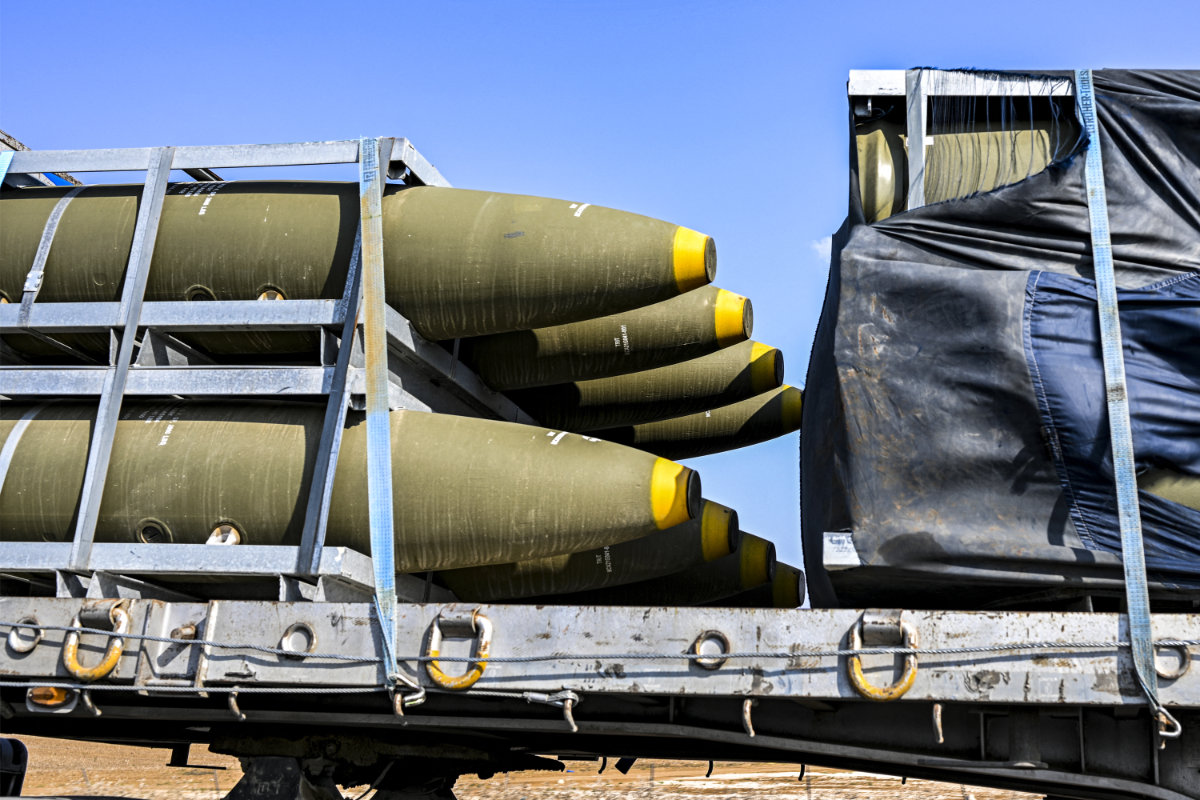
A shipment of 155mm artillery shells supplied by the US for use by the Israeli army is transported on a truck along a highway between the Jerusalem and Beersheba in southern Israel on October 14, 2023. (AFP)
With Palestinians themselves and leaders across the world calling for peace, Levy is not certain that peace should be the top priority when it comes to talks on Palestine, but rather justice for the Palestinian people.
“I am calling for justice, not for peace … maybe peace will be the bonus that we’ll get out of it. But I am not sure that two people are ready for peace, but there is one people who deserve justice. And this must be pushed by the world.”
From 1978 to 1982, Levy worked as an aide and spokesman for Shimon Peres, the then leader of the Israeli Labor Party. In 1982 he began to write for Haaretz, and later worked there as a deputy editor.
He has long written of his support for a one-state solution in which Jews, Arabs, and all citizens have equal rights — a controversial opinion among both Israelis and Palestinians.
“There are 700,000 Jewish settlers in the occupied territories. Nobody is going to evacuate them. And there is no viable Palestinian state with 700,000 Jewish settlers, part of them very violent, all of them very ideological. I don’t see (a two-state solution) happening.”
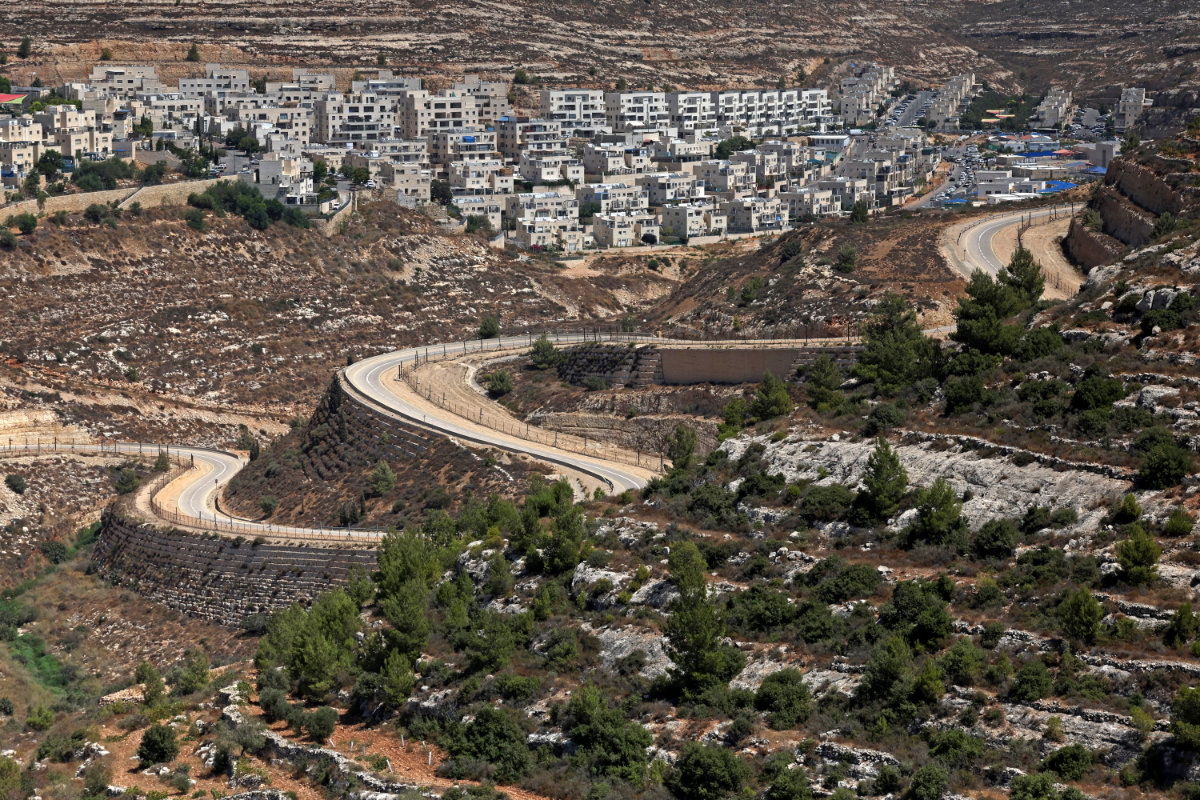
Objects are scattered more than a week after Jewish settlers attacked the occupied West Bank village of Wadi al Seeq on October 24, 2023. (AFP/File)
He added: “If not the two-state solution, what is left? Only the one state … the only problem is that it’s not a democracy.
“I have to tell my fellow Israelis, you can’t have it all. If you wanted a Jewish state, you had to pull out from the occupied territories a long time ago.
“If you want a democratic state, you should give up the Jewish state because you cannot have it both, because there are two peoples here. Either you are an apartheid state or you are a democracy.”
As the Israeli bombardment continues across the entirety of Gaza, many Palestinians have begun to lose hope in their own officials. Even one month prior to the start of the most recent Israel-Hamas war, 78 percent of Palestinians wanted the resignation of Palestinian Authority President Mahmoud Abbas, according to a poll by the Palestinian Center for Policy and Survey Research.

US Secretary of State Antony Blinken (L) meets with Palestinian President Mahmoud Abbas in the city of Ramallah in the occupied West Bank on Feb. 7, 2024, during a Middle East tour, his fifth urgent trip to the region since the war between Israel and Hamas in Gaza erupted in October. (POOL / AFP)
Observers now speculate whether there could be a replacement for Abbas, one that could carry out reforms and to revitalize the PA.
For Levy, jailed Palestinian dissident Marwan Barghouti could be a contender.
“He was the only one who would really unite the Palestinian people, Hamas and Fatah, together. I believed also that he is a man of peace. And he proved it in many ways,” he said.
Barghouti was arrested by Israel in Ramallah in 2002, and two years later was sentenced to five cumulative life sentences on five counts of murder.
“I hope he’s still capable of leading the Palestinians. I don’t have a better idea. I’m not sure Hamas will accept him today. Twenty years ago, yes, (but) I’m not sure today,” Levy said.
“I’m a great believer of him. And because I believe in him, and because so many people believe in him, Israel will never release him. And that’s so tragic.”
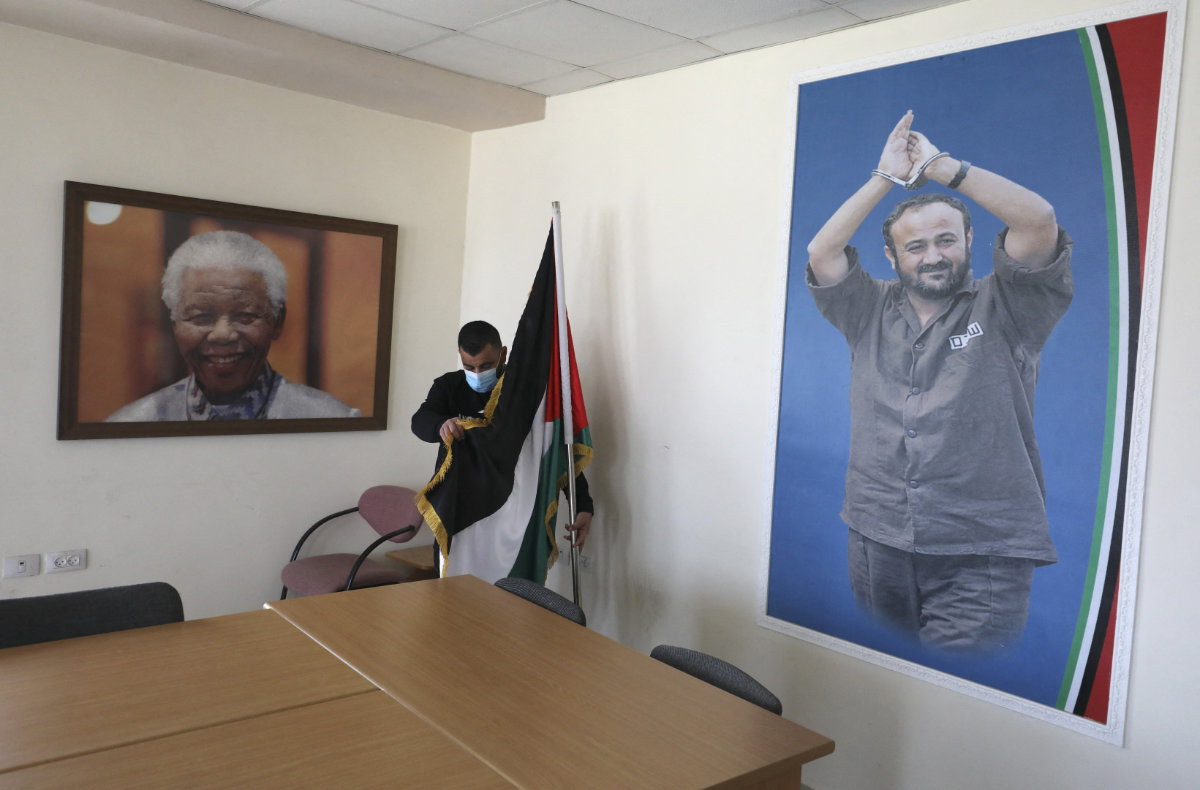
The portrait of jailed Palestinian dissident Marwan Barghouti (R) is seen along with that of the late South African president Nelson Mandela at an office in the West Bank city of Ramallah. Barghouti, in Israeli custody for nearly two decades after being convicted over multiple killings during the second intifada, is being compared to Mandela, who successfully led the resistance to apartheid in South Africa. (AFP/File)
Particularly since October, the popular rhetoric in Israel has increasingly turned against Palestinians, something that Levy blames on a combination of racism and dehumanization.
“If you conduct such a brutal occupation over so many years, if you teach your soldiers and your young people, generation after generation, that there is nothing cheaper, and there is nothing cheaper than the life of a Palestinian, I can tell you, if the Israeli army would have killed so many dogs as it did (people) in Gaza, it would be a huge, huge scandal in Israel.”
In addition to this, Israeli news media, which Levy explains “doesn’t cover the suffering of Gaza,” has played a role in inflaming racist attitudes in the country.
“They know Israelis don’t want to see it, don’t want to hear about it. It’s an outcome of decades of brainwashing, decades of humanization; as I said before, decades of demonization of the Palestinians.
“Israelis don’t meet Palestinians anymore at all, because of the barrier of the (West Bank) separation wall. There’s almost no contact anymore between the two peoples,” Levy said, explaining that the Oct. 7 attack has led Israelis to lump all Palestinians in the same category as Hamas and the perpetrators of the attack.
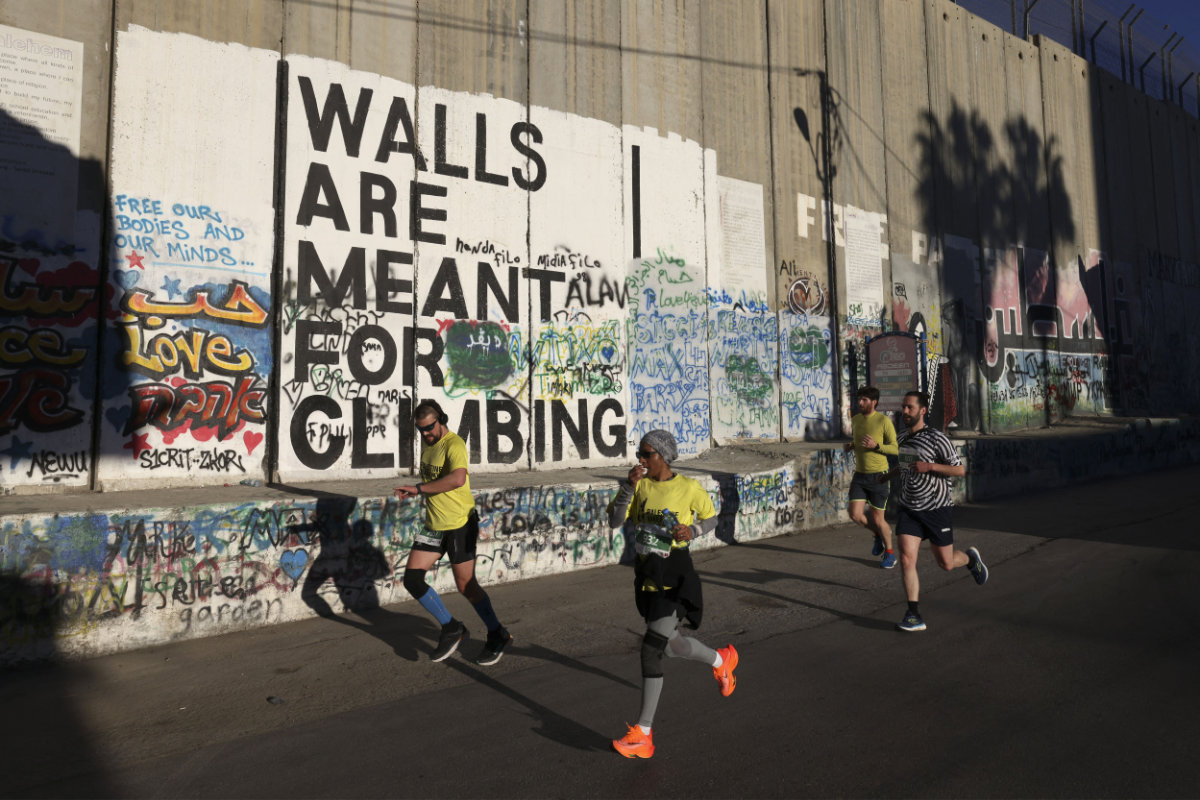
Participants run past a section of Israel's controversial separation barrier during the "Freedom of Movement Palestine Marathon" in Bethlehem in the Israeli-occupied West Bank on March 10, 2023. (AFP/File)
“We are in a very, very low moment in history. And obviously the racism is now politically correct in Israel. It's enough to have one attack, like this terrible attack on the 7th of October, to make all the incorrect political ideas as politically correct.
“Because after what they have done to us, most of Israelis think, we have now the right to do and say whatever we want, because of those horrible things they did.
In the minds of Israelis now, Levy said, “all Palestinians must take responsibility for the October 7 crimes, all of them took part in it.”
